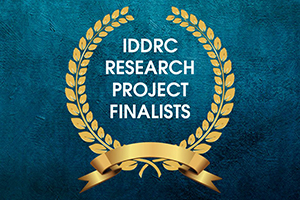Vanderbilt Kennedy Center (IDDRC, UCEDD, LEND) U54 Research Project Finalists Generating Multidisciplinary and Innovative Research in Intellectual and Developmental Disabilities
September 16, 2019

|
Three pilot studies led by Vanderbilt Kennedy Center (VKC IDDRC, UCEDD, LEND) researchers are competing to serve as the signature project of the VKC Intellectual and Developmental Disabilities Research Center (IDDRC). The VKC's IDDRC grant is up for renewal in 2019, and a major component of the grant is the requirement of a research project. A successful grant proposal with acceptance from the Eunice Kennedy Shriver National Institute for Child Health and Human Development will provide five years of funding, continuing the promise and commitments of the VKC and springboarding the research agenda of the innovative competition winner.
VKC director Jeffrey Neul and associate director Laurie Cutting announced a call for U54 Research Project Grant Proposals in June and hence received a flurry of promising applications from an impressive list of Vanderbilt University and Vanderbilt University Medical Center faculty.
"We had a number of creative and innovative applications from a diverse group of interdisciplinary researchers," said Neul. "Though we were only able to provide seed money for three projects in this competition and renewal, I was once again reminded of and impressed with the multidisciplinary breadth of talented VKC members and investigators we have working in IDD across our campuses."
The three selected pilot projects met the call's requirements of emphasizing the centeredness of the VKC IDDRC, using at least three of the five Core services of the VKC IDDRC, having a scientific scope consistent with a budget not exceeding $125,000 per year for five years, and upholding the commitment of the VKC to engage in precision care and supports in its research endeavors.
"Broadly speaking, the theme of the VKC IDDRC grant renewal will be precision care and supports, which means the right intervention or support for the right person at the right time," said Neul. "We funded research projects we thought recognized that an optimal approach to improving the lives of people with IDDs requires a diversity of methods. In this case, we looked for projects that will capitalize on the unique strengths of the Vanderbilt Kennedy Center and the broad Vanderbilt community to achieve these goals."
Each of the projects selected have received $10,000 to collect pilot data. In October of this year, the three principal investigators (PIs) will provide brief presentations of their projects to a review committee, including any pilot data generated over the specified time period. One of the three applicants will then be selected as the signature research project for the VKC IRDDC renewal application.
Let the Science commence!
 Research Project Finalists: Pain management in intellectual and developmental disabilities
Research Project Finalists: Pain management in intellectual and developmental disabilities
Photo: L-R Bennett Landman, Ph.D.,
Carissa Cascio, Ph.D.
Co-PIs: Carissa Cascio and Bennett Landman
Pain is a subjective experience, and as such, self-report is considered the clinical "gold standard" for pain assessment. Reliance on self-report can be problematic for individuals with communication, intellectual, and developmental disabilities (IDD). For these individuals, observation-based tools that aim to capture verbal, nonverbal, and other physiological or behavioral changes associated with pain have become the norm. However, these tools still lack validity and pain assessment in individuals with IDD is still difficult.
Assumptions or false beliefs about biological differences in pain tolerance may be held by providers based on presence of self-injurious behaviors or diminished responsiveness to other sensory events. Additionally, IDD often co-occurs with medical conditions that are inherently painful or require painful treatments or procedures, and for which drug-drug interactions may contraindicate some forms of pharmacological pain management. Thus, multiple factors in this population may lead to: 1) increased painful experiences, 2) decreased recognition or report of patient pain, and 3) challenges in managing even recognized pain. Mismanaged pain, especially in childhood, can lead to fear of medical procedures, chronic pain conditions, anxiety, and other adverse outcomes.
This study aims to expand our understanding of how painful medical procedures are managed in
individuals with IDD, by 1) examining painful procedure frequency and analgesic prescribing practices, 2) understanding the clinical and neurobiological sequelae of mismanaged pain, 3) understanding parental and provider strategies for pain assessment and management, and 4) investigating the neural mechanisms of nonpharmacological interpersonal parent strategies to promote child pain coping.
 Enhanced Behavioral Assessment through Physiological Modeling of Precursors
Enhanced Behavioral Assessment through Physiological Modeling of Precursors
Photo: Amy Weitlauf, Ph.D.
Co-PIs: Amy Weitlauf, Nilanjan Sarkar, Zachary Warren, and John Staubitz
For many people with autism spectrum disorder (ASD) and/or intellectual disability, severe challenging behaviors significantly interfere with functioning or inclusion and, in some cases, are life-threatening. Current methods of behavioral assessment may involve time-intensive, expert-driven procedures that create risk of potential harm by requiring that behaviors be triggered within a clinical setting while an expert therapist watches for precursors, such as changes in eye gaze, vocalizations, activity level, body movements, and affect.
Although promising, existing work on predicting challenging behavior via physiological input has not yet capitalized on the ability to fuse numerous channels of information in real-time to provide actionable, processed data that can be used to predict and modify behaviors.
This study will fuse human decision-making with observed events and multiple streams of data capture, including movement, physiologic input, and vocalizations to create novels ways of understanding and predicting human behavior. Researchers will identify patterns of physiological responses that predict target behaviors through the development of individualized machine learning models and will integrate this information into an app-based technological system.
This system will integrate with existing behavioral coding methodologies in a way that provides therapists with data tracking capabilities while also utilizing their input as the ground truth for model development. Such fusion will not only provide new ways of predicting affective and behavioral states to inform intervention, but would also lay the groundwork for more comprehensive, technologically imbued assessment spaces for capturing diagnostic data.
 Socioeconomic status and risk for emotional and behavioral difficulties
Socioeconomic status and risk for emotional and behavioral difficulties
Photo: Kathryn Humphreys, Ph.D.
Children diagnosed with intellectual and developmental disabilities vary substantially in their long-term functioning. These differences may differ in part based on familial socioeconomic status (SES), given that low SES families tend to detect children's symptoms later in life. They may also be less capable of gathering the resources necessary to obtain appropriate diagnosis, contributing to treatment delays and reduced access to services.
Elevated risks for emotional and behavioral difficulties in typically developing children from low SES backgrounds may also play a role in the comorbidity between IDD and psychiatric disorders. Determining the potential for mitigating the adverse risks for psychiatric comorbidity among individuals with IDD is important, given that the co-occurrence of IDD and psychiatric disorders can predict poorer social and vocational functioning relative to the severity of the IDD.
Such findings underscore the need to 1) better understand the patterns of association between IDD and psychiatric disorders as a function of SES, and 2) examine the pathways by which exposure to low SES may place developing children at risk from the earliest ages by studying patterns of brain development, and emotion regulatory circuitry as a function of SES.
This study will examine SES as a predictor of comorbidity between IDD and psychiatric disorders. It will examine the association between family SES and infant brain development and will examine brain development as a mediator of the relations between SES and early signs of psychopathology.
Courtney Taylor is director of VKC Communications.Three pilot studies led by Vanderbilt Kennedy Center (VKC IDDRC, UCEDD, LEND) researchers are competing to serve as the signature project of the VKC Intellectual and Developmental Disabilities Research Center (IDDRC). The VKC's IDDRC grant is up for renewal in 2019, and a major component of the grant is the requirement of a research project. A successful grant proposal with acceptance from the Eunice Kennedy Shriver National Institute for Child Health and Human Development will provide five years of funding, continuing the promise and commitments of the VKC and springboarding the research agenda of the innovative competition winner.
VKC director Jeffrey Neul and associate director Laurie Cutting announced a call for U54 Research Project Grant Proposals in June and hence received a flurry of promising applications from an impressive list of Vanderbilt University and Vanderbilt University Medical Center faculty.
"We had a number of creative and innovative applications from a diverse group of interdisciplinary researchers," said Neul. "Though we were only able to provide seed money for three projects in this competition and renewal, I was once again reminded of and impressed with the multidisciplinary breadth of talented VKC members and investigators we have working in IDD across our campuses."







